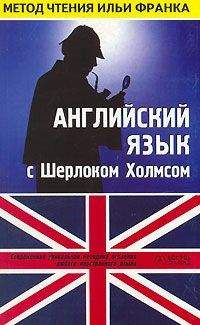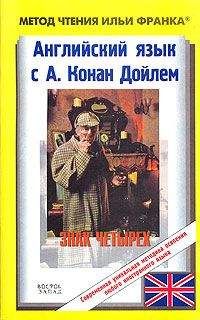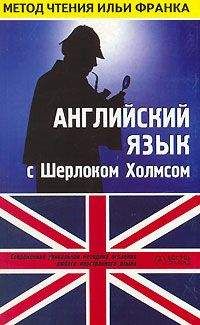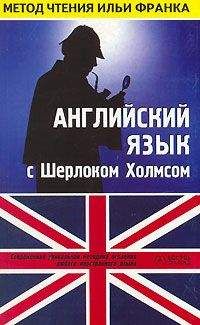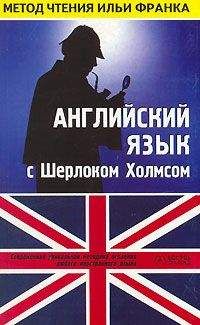thoughtless [ˈƟɔ:tlɪs], remark [rɪˈmɑ:k], fruitless [ˈfru:tlɪs]
“Yes. Her bed this morning had not been slept in, her room was empty, and a note for me lay upon the hall table. I had said to her last night, in sorrow and not in anger, that if she had married my boy all might have been well with him. Perhaps it was thoughtless of me to say so. It is to that remark that she refers in this note:
“‘MY DEAREST UNCLE: — I feel that I have brought trouble upon you, and that if I had acted differently this terrible misfortune might never have occurred. I cannot, with this thought in my mind, ever again be happy under your roof, and I feel that I must leave you forever. Do not worry about my future, for that is provided for; and, above all, do not search for me, for it will be fruitless labour and an ill-service to me. In life or in death, I am ever your loving MARY.’
“What could she mean by that note, Mr. Holmes (что она хотела сказать этой запиской, мистер Холмс)? Do you think it points to suicide (думаете, она /записка/ указывает на самоубийство)?”
“No, no, nothing of the kind (нет, ничего подобного). It is perhaps the best possible solution (возможно, это лучшее решение /проблем/). I trust, Mr. Holder, that you are nearing the end of your troubles (я уверен, что ваши неприятности близятся к концу).”
“Ha! You say so (вы так думаете)! You have heard something, Mr. Holmes (вы узнали что-то /новое/, мистер Холмс); you have learned something (что-то узнали)! Where are the gems (где камни)?”
“You would not think 1000 pounds apiece an excessive sum for them (вы не сочтете чрезмерной платой тысячу фунтов за штуку)?”
“I would pay ten (я заплатил бы десять /тысяч/).”
“That would be unnecessary (в этом нет необходимости). Three thousand will cover the matter (трех тысяч хватит: «три тысячи покроют дело»). And there is a little reward, I fancy (и небольшое вознаграждение). Have you your check-book (у вас с собой чековая книжка)? Here is a pen (вот перо). Better make it out for 4000 pounds (лучше выпишите /чек/ на четыре тысячи фунтов).”
suicide [ˈs(j)u:ɪsaɪd], excessive [ɪkˈsesɪv], reward [rɪˈwɔ:d]
“What could she mean by that note, Mr. Holmes? Do you think it points to suicide?”
“No, no, nothing of the kind. It is perhaps the best possible solution. I trust, Mr. Holder, that you are nearing the end of your troubles.”
“Ha! You say so! You have heard something, Mr. Holmes; you have learned something! Where are the gems?”
“You would not think 1000 pounds apiece an excessive sum for them?”
“I would pay ten.”
“That would be unnecessary. Three thousand will cover the matter. And there is a little reward, I fancy. Have you your check-book? Here is a pen. Better make it out for 4000 pounds.”
With a dazed face the banker made out the required check (в изумлении: «с изумленным лицом» банкир выписал требуемый чек). Holmes walked over to his desk (Холмс подошел к своему столу), took out a little triangular piece of gold with three gems in it (достал маленький треугольный кусочек золота с тремя бериллами), and threw it down upon the table (и бросил на стол).
With a shriek of joy our client clutched it up (с радостным криком наш клиент схватил зубец).
“You have it (вы нашли его)!” he gasped (воскликнул он, задыхаясь). “I am saved! I am saved (я спасен)!”
The reaction of joy was as passionate as his grief had been (реакция радости = радость его была такой же бурной, как и горе), and he hugged his recovered gems to his bosom (он прижал вновь обретенные камни к груди; to recover — вновь обретать; возвращать, получать обратно).
“There is one other thing you owe, Mr. Holder (вы должны еще кое-что, мистер Холдер),” said Sherlock Holmes rather sternly (сказал Холмс очень строго).
“Owe!” He caught up a pen (он схватил перо). “Name the sum, and I will pay it (назовите сумму, и я выплачу ее).”
“No, the debt is not to me (нет, вы должны не мне). You owe a very humble apology to that noble lad, your son (вы должны смиренно просить прощения у того благородного юноши, вашего сына; humble — скромный, смиренный; apology — извинение), who has carried himself in this matter (который держался в этом деле /так мужественно/) as I should be proud to see my own son do (что я гордился бы, если бы мой сын поступил так же), should I ever chance to have one (если бы он у меня был).”
triangular [traɪˈæŋɡjulǝ], bosom [ˈbuzǝm], apology [ǝˈpɔlǝʤɪ]
With a dazed face the banker made out the required check. Holmes walked over to his desk, took out a little triangular piece of gold with three gems in it, and threw it down upon the table.
With a shriek of joy our client clutched it up.
“You have it!” he gasped. “I am saved! I am saved!”
The reaction of joy was as passionate as his grief had been, and he hugged his recovered gems to his bosom.
“There is one other thing you owe, Mr. Holder,” said Sherlock Holmes rather sternly.
“Owe!” He caught up a pen. “Name the sum, and I will pay it.”
“No, the debt is not to me. You owe a very humble apology to that noble lad, your son, who has carried himself in this matter as I should be proud to see my own son do, should I ever chance to have one.”
“Then it was not Arthur who took them (значит, не Артур их взял)?”
“I told you yesterday, and I repeat to-day, that it was not (я говорил вам вчера и повторяю сегодня — не он).”
“You are sure of it (вы в этом уверены)! Then let us hurry to him at once to let him know that the truth is known (так поспешим же к нему и сообщим: «дадим ему знать», что правда /теперь/ известна = что все выяснилось).”
“He knows it already (он уже знает). When I had cleared it all up I had an interview with him (когда я распутал дело, я побеседовал с ним), and finding that he would not tell me the story (и, поняв, что он не хочет все мне рассказать об этой истории), I told it to him, on which he had to confess that I was right (я сам рассказал ему, и ему пришлось признать, что я прав) and to add the very few details which were not yet quite clear to me (и добавить некоторые подробности, которые все еще были неясны мне). Your news of this morning, however, may open his lips (однако ваша утренняя новость может заставить его говорить: «разомкнуть уста»; lip — губа; not to open one's lips — не проронить ни слова).”
“For heaven’s sake, tell me, then, what is this extraordinary mystery (так расскажите мне, ради Бога, об этой невероятной тайне)!”
interview [ˈɪntǝvju:], confess [kǝnˈfes], extraordinary [ɪkˈstrɔ:d(ǝ)n(ǝ)rɪ; ˌekstrǝˈɔ:d(ǝ)n(ǝ)rɪ]
“Then it was not Arthur who took them?”
“I told you yesterday, and I repeat to-day, that it was not.”
“You are sure of it! Then let us hurry to him at once to let him know that the truth is known.”
“He knows it already. When I had cleared it all up I had an interview with him, and finding that he would not tell me the story, I told it to him, on which he had to confess that I was right and to add the very few details which were not yet quite clear to me. Your news of this morning, however, may open his lips.”
“For heaven’s sake, tell me, then, what is this extraordinary mystery!”
“I will do so, and I will show you the steps by which I reached it (я расскажу и покажу, каким образом я достиг /истины/: «покажу шаги, с помощью которых я дошел до истины»). And let me say to you, first (но сначала разрешите сообщить вам /одну весть/), that which it is hardest for me to say and for you to hear (которую мне очень тяжело говорить, а вам — слышать): there has been an understanding between Sir George Burnwell and your niece Mary (между сэром Джорджем Бэрнвеллом и вашей племянницей Мэри существовал сговор; understanding — понимание; договоренность, соглашение). They have now fled together (теперь они оба сбежали; to flee).”
“My Mary? Impossible (невозможно)!”
“It is unfortunately more than possible; it is certain (к сожалению, более, чем возможно; это несомненный факт: «это определенно /так/»). Neither you nor your son knew the true character of this man (ни вы, ни ваш сын не знали истинного облика этого человека) when you admitted him into your family circle (когда впустили его в свою семью; to admit — допускать; принимать; family circle — семейный, домашний круг). He is one of the most dangerous men in England (это один из опаснейших субъектов Англии) — a ruined gambler (закоренелый игрок; ruined — разрушенный; опустошенный, разоренный), an absolutely desperate villain (совершенно отъявленный негодяй), a man without heart or conscience (человек без сердца и совести). Your niece knew nothing of such men (ваша племянница ничего не знала о подобных людях). When he breathed his vows to her (когда он шептал ей клятвы /в своей любви/; to breathe — дышать; негромко говорить; шептать, «ворковать»), as he had done to a hundred before her (как он делал сотне до нее = как и многим другим до нее), she flattered herself that she alone had touched his heart (Мэри тешила себя мыслью, что лишь она одна сумела завоевать: «тронуть» его сердце; to flatter oneself — тешить себя надеждой, мыслью; to flatter — льстить). The devil knows best what he said (одному дьяволу известно, что он говорил), but at least she became his tool (но так или иначе она стала орудием в его руках; at /the/ least — по крайней мере, по меньшей мере) and was in the habit of seeing him nearly every evening (и имела обыкновение видеться с ним почти каждый вечер).”
certain [sǝ:tn], desperate [ˈdesp(ǝ)rɪt], conscience [ˈkɔnʃ(ǝ)ns]
“I will do so, and I will show you the steps by which I reached it. And let me say to you, first, that which it is hardest for me to say and for you to hear: there has been an understanding between Sir George Burnwell and your niece Mary. They have now fled together.”
“My Mary? Impossible!”
“It is unfortunately more than possible; it is certain. Neither you nor your son knew the true character of this man when you admitted him into your family circle. He is one of the most dangerous men in England — a ruined gambler, an absolutely desperate villain, a man without heart or conscience. Your niece knew nothing of such men. When he breathed his vows to her, as he had done to a hundred before her, she flattered herself that she alone had touched his heart. The devil knows best what he said, but at least she became his tool and was in the habit of seeing him nearly every evening.”
“I cannot, and I will not, believe it (я не могу и не стану этому верить)!” cried the banker with an ashen face (вскричал банкир, лицо его при этом было мертвенно-бледным; ash — пепел; ashen — пепельный, из пепла; мертвенно-бледный).
“I will tell you, then, what occurred in your house last night (тогда я расскажу вам, что произошло в вашем доме вчера ночью). Your niece, when you had, as she thought, gone to your room (ваша племянница, когда вы, как она подумала, ушли к себе в комнату), slipped down and talked to her lover through the window (спустилась вниз и стала говорить со своим возлюбленным через окно) which leads into the stable lane (выходящее на дорожку к конюшне). His footmarks had pressed right through the snow (его следы ясно и глубоко отпечатались на снегу), so long had he stood there (настолько долго он там стоял). She told him of the coronet (она сообщила ему о диадеме). His wicked lust for gold kindled at the news (его мерзкая страсть к золоту вспыхнула при этом известии), and he bent her to his will (и он подчинил Мэри своей воле: «склонил к своей воле»). I have no doubt that she loved you (я не сомневаюсь, что она любила вас), but there are women in whom the love of a lover extinguishes all other loves (но есть такие женщины, для которых любовь возлюбленного затмевает все другие виды любви; to extinguish — гасить, тушить; убивать, гасить /надежду, любовь/; превосходить), and I think that she must have been one (и, думаю, Мэри из их числа). She had hardly listened to his instructions when she saw you coming downstairs (едва она /успела/ получить его указания, как увидела, что вы спускаетесь по лестнице), on which she closed the window rapidly (тогда: «на что» она быстро закрыла окно) and told you about one of the servants’ escapade with her wooden-legged lover (и сказала вам о том, что к одной из служанок приходил возлюбленный с деревянной ногой; escapade — веселая и смелая проделка; шальная выходка; побег /из заключения/), which was all perfectly true (что было совершенной правдой).
